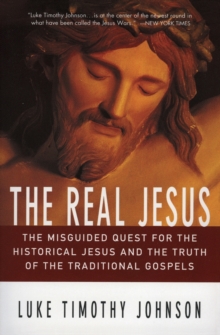Chapter OneThe Good News and the Nightly NewsRecent years have been very good for the Jesus business in America.
I don't mean the Jesus business that goes on in churches, but the profitable trade in Jesus by a variety of publications that by creating a commotion in both the academy and the church also create a media-fed demand for more of the same.
Sales in scandal are high, stocks in shock are rising, and futures on the historical Jesus are sound.
Commerce in the Christ has rarely been better.In this bullish market, the most remarkable entrepreneurship has been demonstrated by the Jesus Seminar, a ten-year exercise in academic self-promotion that has succeeded in drawing an extraordinary amount of attention to itself.
Indeed, it has come to symbolize, for better or worse, the controversy over "the Historical Jesus." Although it stands as a far better example of media manipulation than of serious scholarship, the Jesus Seminar provides the appropriate starting point for considering the character of the present debate over the Historical Jesus as a moment in a culture war in which the institutions of academy, church, and media are drawn into confused conflict and collusion.The Jesus SeminarWhat is the Jesus Seminar?
It is a small, self-selected association of academics who meet twice a year to debate the Historical Jesus.
The seminar was founded in 1985 by Robert Funk under the auspices of his Westar Institute in Sonoma, California.
The Jesus Seminar has been co-chaired from the beginning by John Dominic Crossan of DePaul University in Chicago.
It is Funk, however, who has been the most visible and vocal presence for the public, and the shaper of the Seminar's agenda.Funk is no strangerto entrepreneurship or controversy.
A New Testament scholar of well-established credentials, he is the former executive secretary of the Society of Biblical Literature (SBL), the most comprehensive and important learned society for biblical studies.
Under his leadership, the SBL grew in size and ambition, linking up with the American Academy of Religion to form a megasociety whose national meeting gathers thousands of scholars from around the world, and spawning a number of publishing ventures under the sponsorship of the Scholars Press.
Funk is, in short, a scholar with broad horizons and a knack for power that is highly personalized.
Scholars Press, for example, was created by Robert Funk and followed him from his academic appointment in Missoula, Montana, to Chico, California.
His directorship of the Scholars Press, however, came to "an abrupt end" with considerable controversy in 1980 (Council on the Study of Religion Bulletin, Dec. 1981, p. 143).The Jesus Seminar is not affiliated with either the Society of Biblical Literature or the other international association for New Testament scholars, the Studiorum Novi Testamenti Societas.
It does not, therefore, represent anything like a consensus view of scholars working in the New Testament, but only the views of a group that has been -- for all its protestations of diversity -- self-selected on the basis of a prior agreement concerning the appropriate goals and methods for studying the Gospels and the figure of Jesus.
It is, from beginning to end, an entrepreneurial venture guided by Robert Funk.These observations do not detract from the legitimacy of the Seminar or its right to conduct its business as it chooses.
But in the light ofits own statements and media coverage, it is appropriate to clarify its precise academic standing.
Sometimes, for example, the phrase "some two hundred scholars" has occurred.
To someone unacquainted with the immensity and complexity of higher education in America, two hundred scholars may seem an impressively large number.
In fact, however, it is a very small number when placed against the number of New Testament scholars alone who are involved in the work of the SBL (at least half of the 6,9oo members of that organization), let alone the thousands more with substantial scholarly training in the New Testament who for personal or ideological reasons do not take part in the society's activities. And even the number "two hundred is somewhat misleading, since it includes all those who were part of the Seminar's proceedings in any fashion -- by receiving its mailings, for example, or reading its reports.
A truer estimate of the number of participants who met regularly, wrote papers, and voted on decisions is closer to forty.
The Seminar's climactic publication, "The Five Gospels (to be discussed below), lists seventy-four "fellows" of the seminar.
The numbers alone suggest that any claim to represent "scholarship 11 or the "academy" is ludicrous.While the Seminar can count among its members some scholars of notable reputation (Funk and Crossan have both produced significant and well-recognized work), and while the Seminar's work increased the visibility of some others (notably Marcus Borg), the roster of fellows by no means represents the cream of New Testament scholarship in this country.
Of the major "graduate New Testament faculties, only Claremont is presently represented.
EmoryUniversity had one participant for a time. Otherwise, the roster of fellows includes no present faculty at Yale, Harvard, Princeton, Duke, Union, Emory, or Chicago.
The faculties at such schools are not necessarily hostile to the Seminar's work, but no members of those faculties are participants.
The Seminar does not include established scholars from England or the Continent, although it does have some members from Canada and South Africa.
Most of the participants are in relatively undistinguished academic positions.
Some are not in the strict sense in academic positions at all.These observations do not reflect on the seriousness or ability of the members.
They are meant only to deflate the sometimes grandiose claims made by and for the Seminar as representing critical New Testament scholarship.
It patently does no such thing.

